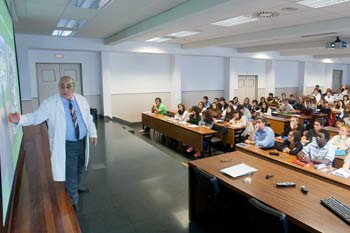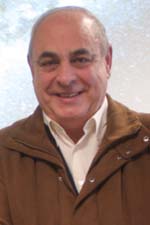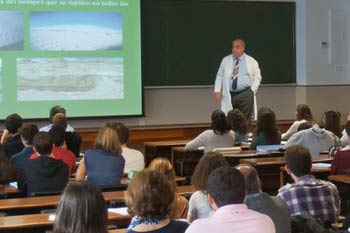Last class of Professor Héctor Mancini
The professor of the University of Navarra gave his last physics class to the students of 1st year of Biology and Biochemistry on "Size, form and function of nature".

PHOTO: Manuel Castells
How do you remember your arrival at the University of Navarra?
22 years ago I came from Argentina with a "sabbatical year" funded by the Spanish Ministry of Education and Science (MEC) to help a great friend, Carlos Pérez García, who unfortunately died in 2004 in a mountain accident. I had met Carlos at a physics congress in El Escorial in 1982, we became friends and started to collaborate. In 1990 he was hired as director of the Physics department . At that time I was at the University of Colorado where he wrote to me and asked me financial aid "to set up a physics department ". I kept that letter for many years, in it he told me: "come on, I need a physicist with profile as a plumber"..., "I need you to set up a group of research , everything is still to be done, so I'll wait for you"..., "ah!..., but you have to get your salary"... and things like that.
That challenge convinced me, I applied first for a one-month stay in a contest organized by the high school Iberoamerican International Cooperation, to teach a course of postgraduate program on Lasers and, almost simultaneously, to the sabbatical program of the MEC, which was of very good level and had an extra item that helped pay for the trip to the whole family. Against all odds I was granted both. And so I came, provisionally for one year, then they offered me to stay, and it's been 22.
How did the programs of study and the research evolve on your area?
There was no research and we were given a place in what was then a basement, in the basement of the Library Services building. That's where we started. The first problem we had to solve was the problem caused by the lack of a physics degree program at the University. There were no students here, so the physics and mathematics assistants were doctorate students from other majors who hardly knew subject. As usual, their interest was their own research which had nothing to do with physics. The final result was that there were no replacement professors to teach the classes which by then were many. Every year, the then Dean of the School of Sciences, Rafael Jordana, according to his own words, went out in desperation to look for teachers in the secondary schools.
The only way to overcome this obstacle was to create a focus of interest here, so that a group of physicists, "a seed", could grow and germinate. At the same time, we needed to set up a doctoral program with a very attractive cutting-edge research , so that students from other universities, with the highest possible level (we were looking for averages above 7.5), would leave their professors they knew and come to Navarra to do their doctorate here. Once they had finished, they would go to the USA, France or Germany to work in a center compatible with our research, and at the end they would want to return to start their research degree program and professor. A difficult task. It was not enough to form "a group" of physicists, we had to create a "school of physics" and with students that we did not have. There is a huge difference with a university that has this degree program of Degree, where students go to knock on the door of the professor to ask him to direct their doctorate.
In summary, in less than five years we were already recognized in Europe and America as an active group in complex systems and nonlinear dynamics, and in little more than 10 years, we were already an experimental group of reference letter international topic. This is how we were described in the journal of the Real Sociedad Española de Física in 2004, on the occasion of the death of Carlos Pérez.
Since 2006, that first generation that helped us in the beginning took the reins of department and high school of Physics and became position of management until today. They have continued to develop the research in an impressive way in quality and quantity, and the international flow of students and professors does not cease. Continuity is assured.
What has partnership been like between Schools since you joined the center?
We have always been open to maximum cooperation. Since we were created as an inter-faculty department , we have taught classes from the beginning at Schools in Science, Pharmacy and Medicine. And later, we collaborated by teaching at School in Architecture and in Law. At the request of who was then his director, I collaborated in the launching of the degree program of Telecommunications Engineering at the School of Engineers of San Sebastian, teaching some subjects such as Lasers, in third year, or Optical Communications I and II, in fifth year. And also, getting some agreements like the one that still works today with the University of Colorado, where many of our engineering students have made their final project . The infrastructure of a laboratory of research was also set up in Miramón. All this without prejudice to the usual tasks in the School of Sciences.
Carlos Pérez also taught some Thermodynamics and Fluids subjects, and more recently other professors have continued the partnership with Tecnun, at the level of Degree and Master's Degree.
Some of the professors of department such as J. Burguete, D. Maza or A. Peláez have directed thesis doctoral program of researchers coming from the Clínica Universitaria and CIMA. Topics such as oncological treatments with ionizing radiation, or dynamic models applied to specific cases were developed in partnership .
I would also like to point out that Carlos Pérez, who from a very young age was a disciple and partner of don Mariano Artigas in the study of the relationship between science and faith, was one of the founders of the CRYF (the university's group dedicated to the study of the relationship between Science, Reason, and Faith, with headquarters at the Ecclesiastical School of Philosophy). I myself (currently still a member partner), after the death of its director, don Mariano Artigas, by vote of its members, was elected director to finish his term. The Physics high school was the first, and I do not know if it is not the only one in the University, to adhere to the CRYF.
committee He has been director of high school of physics at the University of Navarra, director of projects of the Center for Research in Lasers and Applications (CEILAP), of the National Center for Scientific Research (CONICET) and of the Ministry of Defense (Argentina), among others. A long and varied career, what has each of these positions contributed to you at staff?
The most important thing in my life has always been research. The teaching at the level of Degree and postgraduate program is a need for communication of ideas and thoughts that should serve to create discussion and discussion, ideas are not imposed. On the other hand, management is a service that we must provide when requested. For my taste, I have had too much time devoted to management. But it has been compensated by the relationship that I had and maintain, over many years, with all those who were at the time "my students". To see them today as scientists, I would say, almost all of them with a very high level, much higher than mine, some with very important international distinctions or directing research institutes that are among the most important in the world, fills me with pride and satisfaction.
How did you experience the tribute paid to you by your colleagues and students on Friday?
It was very emotional. There were students, some alumni from Degree, fellow teachers from School and part of my family. Also some of the authorities.
It was a simple class that ended with a few words from Mr. Dean of sciences, who gave me a gift: he made us listen to a song by don Atahualpa Yupanqui, which speaks of "...an Argentine heart and a little Spanish road, before they did not know each other, today they are both friends"... In a few minutes 22 years of friendship and dreamed projects at the university passed before my eyes. Very moving.
Of all the moments you have experienced at the university, which one or ones do you remember the most?
I wouldn't know how to choose any of them because I have learned something from all of them, even from the mistakes or bad moments, which there were also some. Yes, there is a moment that I would have liked never to happen, the death of Carlos Perez. Today we would both be celebrating and singing at a barbecue, just like in the beginning.
In addition to being a scientist and academic, you are a musician, will you dedicate from now on more time to this art or will you continue researching in your area?
"Musician" is a very big word and deserves a deep dedication to be one. I should leave my other activities to make music seriously. More than being a musician, I love music under all its perspectives, from the attentive listening, to the interpretation at the best level that is possible for me (which is modest), or the composition, even with the few theoretical tools that I handle.
But that curiosity, almost childish, that I keep at almost 70 years of age to know about human thought, to discover some secret of nature and its functioning, for a new theory about the training of the universe, a score by Bach or Chopin, or for the content of some ancient manuscript, make me not to stray too far from the research, in my area and also in others...
I have always tried to look for the truth in things and in people. Because meeting in it, in addition, the goodness and beauty that enhances them, that is, God.
Therefore, to the best of my ability, I will continue with both.


